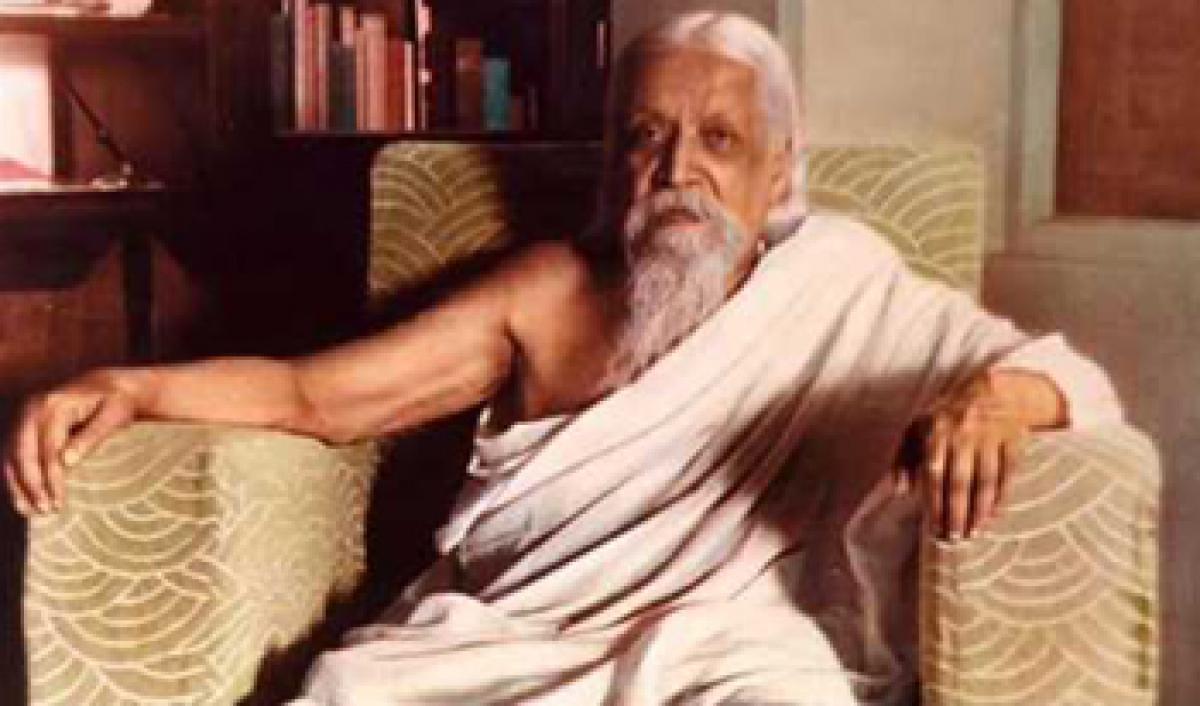Live
- ICC chief Jay Shah meets Brisbane 2032 Olympics organising committee CEO
- Oxford Grammar High School Celebrates 44th Annual Sports Day with Grandeur
- Indian banking sector’s health remains robust, govt policy working very well: Top bankers
- iOS 18.2 Unveiled: New Features with ChatGPT Integration Revolutionize Your iPhone
- 'Run for Viksit Rajasthan' to be annual event, says CM Sharma
- Nitish Kumar launches '109 free medicine vehicles' in Patna
- India have to play their best cricket at the Gabba to win series: Harbhajan
- Income tax refunds jump 46.3 pc to Rs 3.04 lakh crore in April-Nov
- Financial Intelligence Unit detects undisclosed income worth Rs 11,000 crore in 2024: Centre
- Odisha BJP chief to be elected in January
Just In

A poet of patriotism and prophet of nationalism. Every year the 15th of August, which coincides with India\'s Independence Day, Hindus celebrate the birth anniversary of Rishi Aurobindo — the great Indian patriot, scholar, litterateur, philosopher, social reformer,awakner and visionary.
 Every year the 15th of August, which coincides with India's Independence Day, Hindus celebrate the birth anniversary of Rishi Aurobindo — the great Indian patriot, scholar, litterateur, philosopher, social reformer,awakner and visionary.
Every year the 15th of August, which coincides with India's Independence Day, Hindus celebrate the birth anniversary of Rishi Aurobindo — the great Indian patriot, scholar, litterateur, philosopher, social reformer,awakner and visionary.
Aurobindo was born in a Bengali family in Calcutta in 1872. His father Dr K D Ghose christened him Aurobindo Ackroyd Ghose at birth. He studied at Loreto Convent School Darjeeling and St Paul's School in London and King's College, Cambridge. He was academically brilliant.
He was proficient in English, Greek, Latin and French. He also became well-acquainted with German, Italian and Spanish. He qualified for the Indian Civil Service (ICS) but was dismissed from the Service for not presenting himself at the riding examination upon completion of his two years of probation.
In 1893, at the age of 21, Aurobindo Ghose began working under the Maharaja of Baroda. In 1906, Aurobindo left the position of the Principal of India's first National University in Calcutta, and plunged into active politics. He participated in India's freedom struggle against the British.
And soon became a prominent name with his patriotic editorials in Bande Mataram. For the Indians, he became, as said C R Das, "the poet of patriotism, the prophet of nationalism and a lover of humanity", and in the words of Netaji Subhas Chandra Bose, "a name to conjure with.”
The British took him under detention and imprisoned him from 1908 to 1909. However, this one year of seclusion turned out to be a blessing in disguise not only for Aurobindo but for mankind as well. It was in prison that "he first realized man should aspire and emerge into a completely New Being and try and create a divine life upon earth.”
This vision led Aurobindo to undergo a profound spiritual transformation, and it is believed that after one such meditative trance in jail, he rose up to proclaim that India would gain her freedom at midnight on 15th August, 1947 — Aurobindo's birthday.
Indeed, it rang true!
In 1910, obeying an inner call, he arrived at Pondicherry, which was then a French territory, and established what is now known as the Auroville Ashram. He left politics entirely and dedicated himself wholly to an inner awakening, which would spiritually elevate mankind forever.
He spent tireless years on the path of ‘Internal Yoga,’ i.e., to acquire spiritual uplift of the mind, will, heart, life, body, the conscious as well as the subconscious and the superconscious parts of ourselves, to gain what he called the "Supramental Consciousness.”
Rishi Aurobindo left behind a substantial body of enlightening literature. His major works include The Life Divine, The Synthesis of Yoga, Essays on the Gita, Commentaries on the Isha Upanishad, Powers Within — all dealing with the intense spiritual knowledge that he had gained in the practice of Yoga.
Many these appeared in his monthly philosophical publication, the Arya, which appeared regularly for 6 years until 1921. His other books are The Foundations of Indian Culture, The Ideal of Human Unity, The Future Poetry, The Secret of the Veda, The Human Cycle.
Among students of English literature, Aurobindo is mainly known for master piece Savitri, a great epical work of 23,837 lines directing man towards the Supreme Being. This great sage left his mortal body in 1950 at the age of 72. He left to the world a priceless heritage of spiritual glory that alone can free man from the troubles that beset it.
His ultimate message to humanity, he summed up in these words: "A divine life in a divine body is the formula of the ideal that we envisage." Remembering Aurobindo Gosh and paying tributes to this Bhrathputra is a bounded duty of every Indian. (The writer is a retired professor, IASE, Madanapalle)
By Prof V Ranga Charlu

© 2024 Hyderabad Media House Limited/The Hans India. All rights reserved. Powered by hocalwire.com







